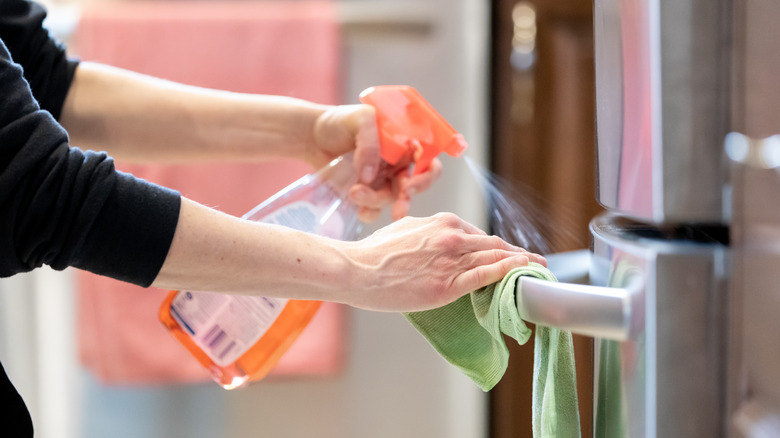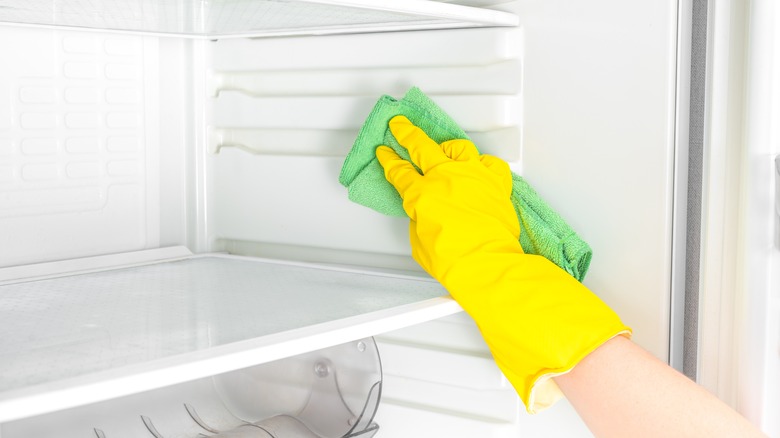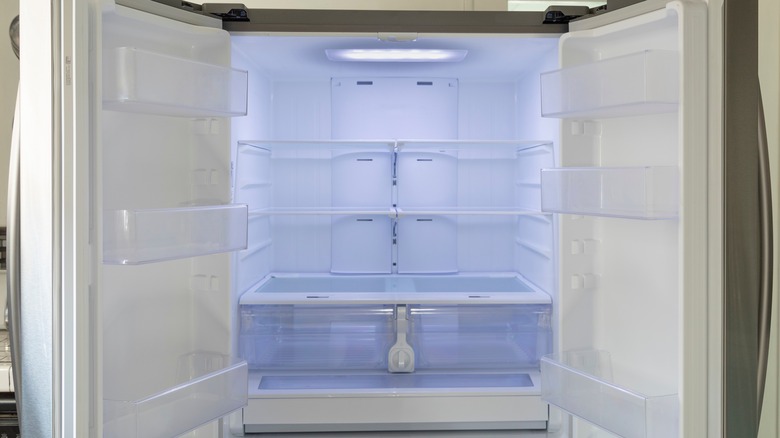How Often Do You Really Need To Be Cleaning Your Fridge?
There's a lot that goes into keeping a kitchen clean and hygienic. Some items must be cleaned every day (counters, dishes, floors, etc.), whereas others can be wiped down at the end of each week (stoves, sinks, range hoods, and the like). On the flip side, appliances like dishwashers and microwaves must be tackled every month or so to keep them functioning properly.
So, what about a refrigerator — where exactly does that fall on the list? Well, it depends. There are some parts of a refrigerator that need to be cleaned more frequently than others. For instance, door handles and buttons (if there are any) that are constantly touched must ideally be dusted down with disinfectant wipes every day. It's also best to clean food spills immediately to prevent bacteria from infesting the other contents of your fridge. Inspect perishable items on a weekly basis, and clear out anything that may have expired – after all, it's a tidy tip that can help you achieve a cleaner refrigerator in the long run, too.
Then comes the question of a deep clean, which means emptying out the appliance, including taking out all the shelves and giving everything a good scrub. Ideally, this needs to be done every three or four months, but that's only if you're thorough about the refrigerator's daily and weekly upkeep. If not, you might find that your fridge gets dirty enough to require a deep clean as often as every month.
How to deep clean the inside of your fridge
The first step before you get started with deep cleaning your refrigerator is to switch it off and remove the plug. Next, empty the appliance and take out all removable parts, including the shelves, baskets, and drawers. You can either handwash these in the sink with soap and water, or pop them in the dishwasher – as long as they aren't made from thin plastic or glass, which can shatter in there, and don't have any LED lights on them. Give the compartments enough time to come to room temperature first though, as they can crack when exposed to sudden temperature changes.
Once the removable components are out of the way, it's time to scrub the insides. Now, you could use the help of chemical cleaners of course, but that isn't always necessary. Natural alternatives can do an equally fine job, and they won't leave that synthetic stench in the fridge that chemical cleaners so often do. Simply dip a cloth or a non-abrasive sponge in some soapy water and gently wipe the interiors.
For more stubborn stains, make a runny paste of baking soda (the best natural kitchen cleaner) and water using a 1:7 ratio. Scrub it over the grime before wiping it off with a clean cloth. Alternatively, you could mix white vinegar with twice the amount of hot water and spray that all over. Dry everything properly with a towel after, and voila! Your fridge will be squeaky clean on the inside.
What about the other parts of your refrigerator?
A deep clean doesn't just mean washing the shelves and scrubbing the insides of the fridge; it also means cleaning every part of the appliance. Wipe down the outsides with a cloth dipped in soapy water – or with a paper towel and a specialized cleaner if the doors are made from stainless steel. Don't overlook the rubber gaskets wedged around the door as these can be packed with grime, too.
It's also a good idea to clean the coils so that they don't impair the efficiency of your refrigerator. Check the manual to locate where these are, and then carefully wipe them with a soft brush. Don't forget to vacuum underneath the fridge too — you'll be astonished to see just how much dust can gather there.
Make sure to change the water filter every six months (or as often as the manual specifies) if your fridge has ice or water dispensers. And finally, don't forget to clean the freezer at least once every year. You can clean it much the same way as you would the interiors of the fridge — with soap or a vinegar and water solution. However, make sure that the freezer is empty and defrosted until all the ice has melted first. It might create a watery mess, but it's an important step that will also ensure that your freezer keeps performing at its best. Load your freezer properly once you're done cleaning it and you'll be good to go!



